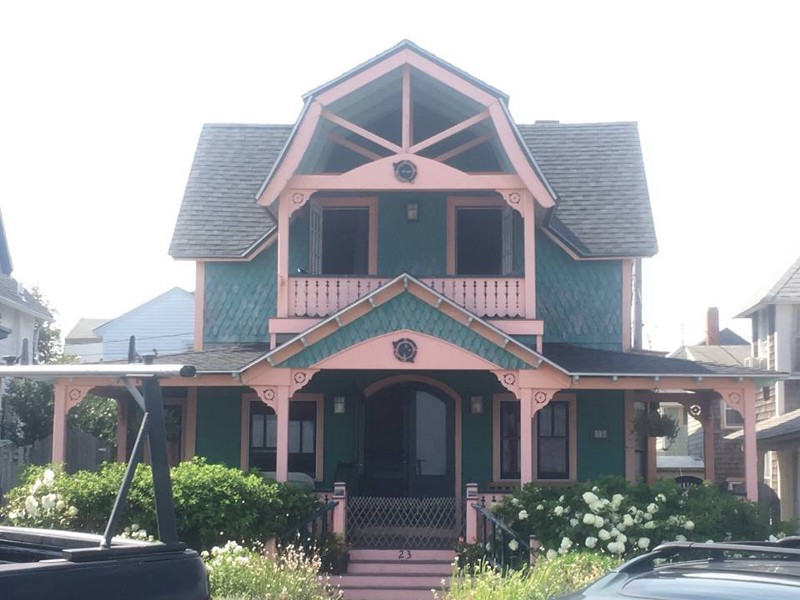The Presidential island
Martha’s Vineyard, the dry isle in the Atlantic
The Cape Cod peninsula reaches out in an easterly then northerly direction, but nestled in the south-west corner is Falmouth, from where one hops aboard the quickest ferry to Martha’s Vineyard. It’s hard not to say it like a Simpsons skit on JFK’s long-vowelled accent — Maaahtha’s Vinyaaaahd — and while nobody knows for sure who Martha was, we do know that she is commemorated in one of only five US placenames to contain an apostrophe.
Farewell to Falmouth, like a modern-day pilgrim.
Considering its name, Martha’s Vineyard is remarkably viniculture-free. In fact, much of the island hasn’t served alcohol since Prohibition. Until the last decade, you could only get grog in Edgartown and Oak Bluffs, two of the larger settlements “down-island” (to the east; it’s an old whalers’ term). In 2010 Vineyard Haven also decided to allow restaurants to sell beer and wine; in early summer 2017 this was extended to spirits, but again only in restaurants — you won’t find a bar or off-licence — and only after a public vote passionately fought out in the letters pages and opinion columns.
Although it’s invidious to reduce any place to a single reference point, to the wider public Martha’s Vineyard is arguably best known as the haunt of presidents. It also has a long history of housing artists and musicians, but their leisure time doesn’t tend to make the news. Well-heeled Democrats have long been drawn to one of the Eastern seaboard’s nicest spots; the Kennedys were regulars until Ted drove off Chappaquiddick’s Dike Bridge (when it wasn’t even open to public traffic), the resultant drowning of Mary Jo Kopechne somewhat harshing the buzz and ending Ted’s Presidential ambitions. Instead the US public stuck with Tricky Dicky Nixon, and I’m sure that all ended well.
In 1977 Martha’s Vineyard considered seceding from Massachusetts, either as a 51st state or to join another (they had offers from Vermont and, perhaps less workably, Hawaii). Eventually they dropped the idea and life went back to normal.
With Jimmy Carter — the sole blue presence in the White House between 1969 and 1993 — preferring to spend his downtime elsewhere, it took a quarter of a century post-Chappaquiddick for Presidents to return to the Vineyard. But back came the bathing-suited Blues: the Clintons rested up here, and the Obamas followed suit during Barry’s breathers.
It’s tempting to imagine the holidaying Obamas as sticking out, not just for the necessary security presence but also for the colour of their skin. However, while Martha’s Vineyard might seem a playground of white privilege, it’s also been a holiday destination for significant numbers of African-Americans for well over a century.
A few short miles from principal entry port Vineyard Haven is Oak Bluffs, perhaps the archetypal chocolate-box Cape Cod destination, where we watched a solar eclipse through borrowed safety specs.
With gingerbread houses arranged around a bandstand-boasting village green, Oak Bluffs is part Cape Cod, part Cotswolds on the coast. It’s also home to a healthily significant number of African-Americans, some of them among the visitors who swell the island’s population to 150,000 in the summer, some of them among the 15,000 year-rounders who tut loudly that the islands sink by three inches when the tourists all jump off the ferry.
To those whose only experience of the USA is via a mediated screen, that might not fit a cosy pattern. But the truth is that there are many different Americas, that’s part of the appeal, and to lump them all together as a homogenous mass is as simplistic as it is offensive: a generalisation on the order of comparing me with Nigel Farage, Margaret Thatcher or Ian Brady. The regrettably buyable US political system appears to be sending the country’s leadership to hell in a handcart, forgiving the unforgivable and pardoning the unpardonable — but that doesn’t mean that everyone in the land wanted that to happen, agrees with it or even condones it, any more than Orgreave and Hillsborough should lead to a tourist boycott of England. The US has its problems but I still believe the good people outnumber the bad and anyone assuming otherwise without finding out for themselves might wish to examine how much their contempt prior to investigation is due to their own inbuilt prejudices.
Finally from Cape Cod: a dustbin with a luxuriant moustache.
Originally published on Facebook, 29 August 2017.











